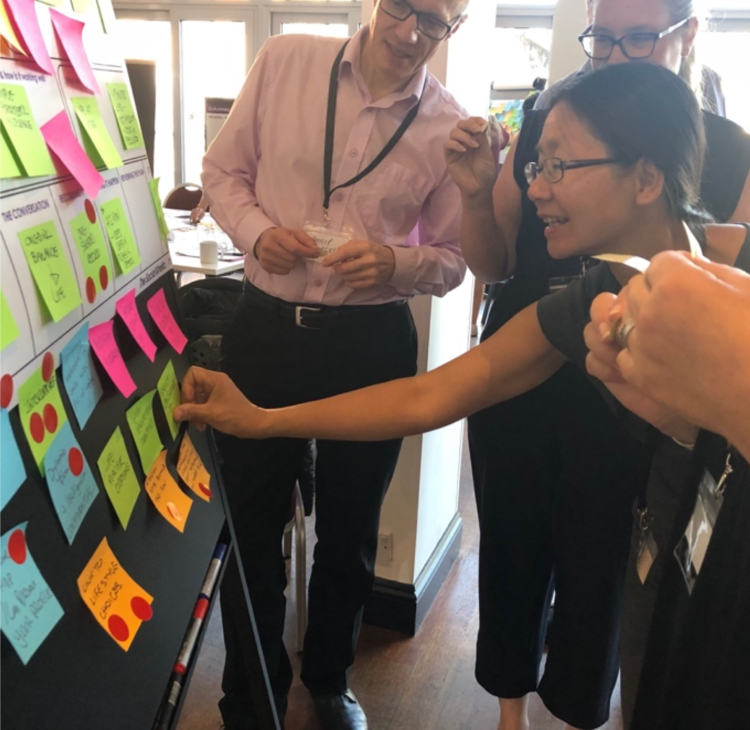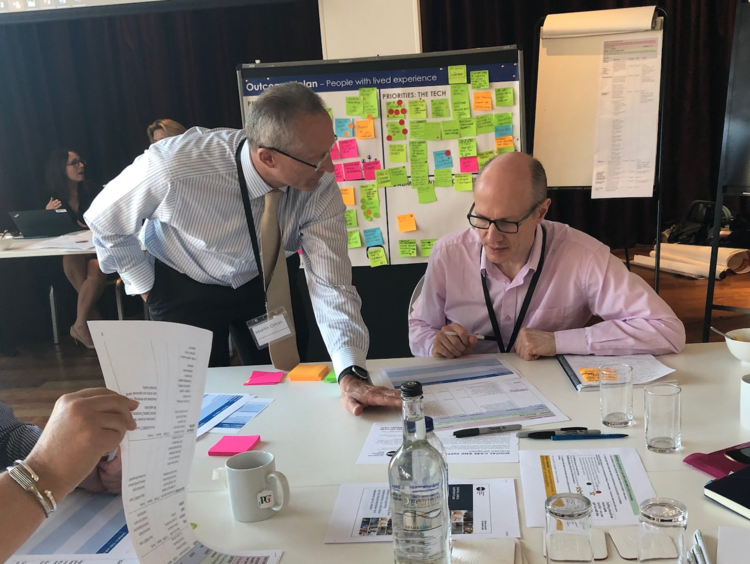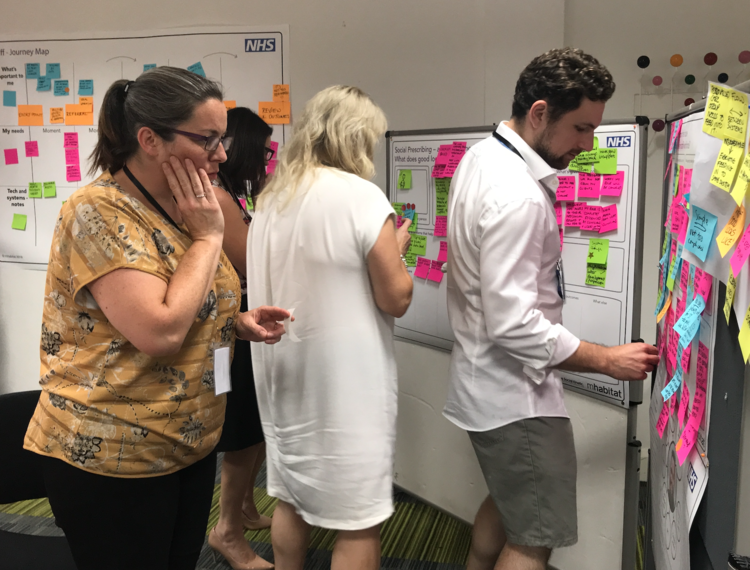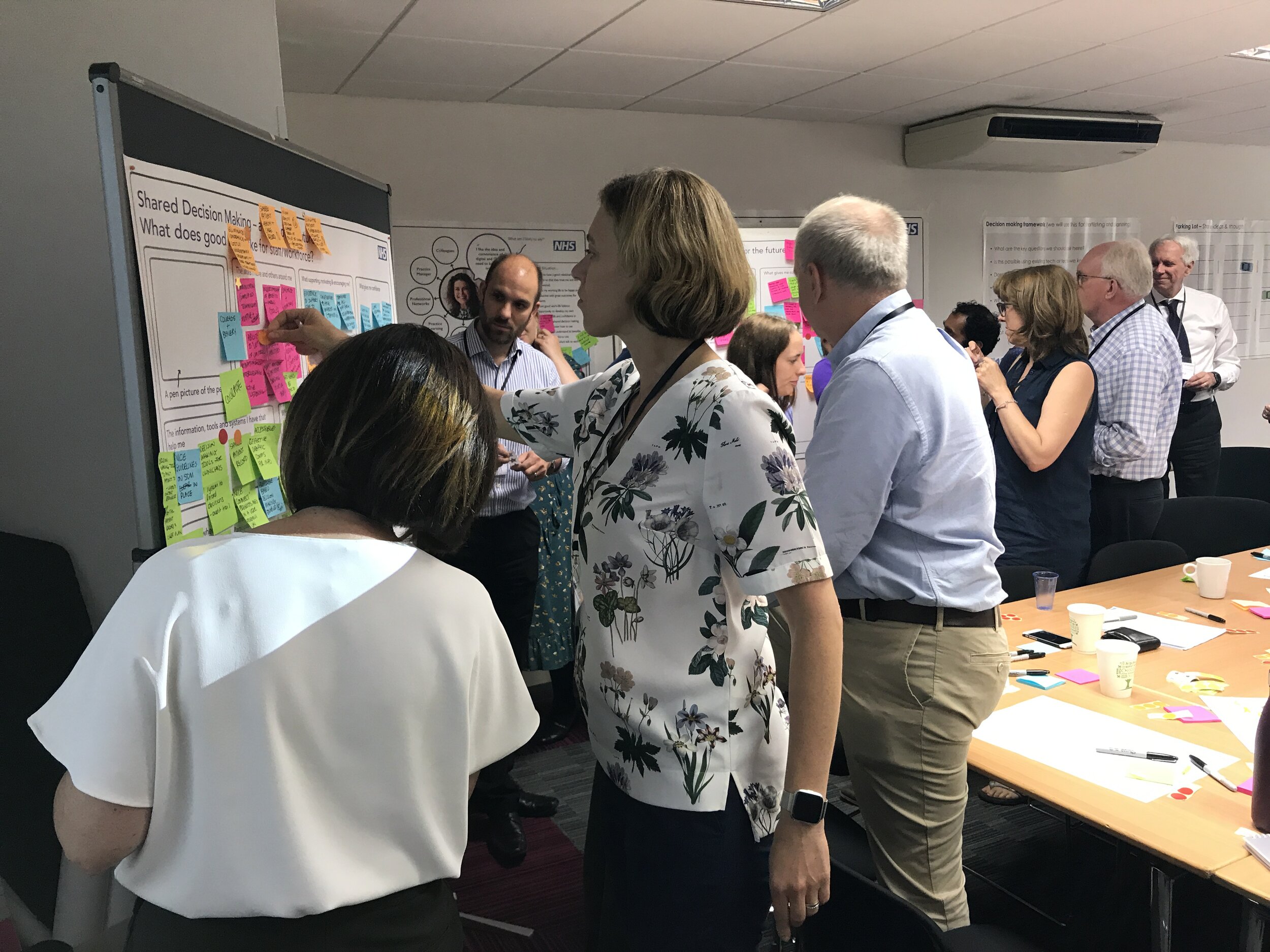NHS England
Transforming personalised care with a digital road map for the future
IN SUMMARY
What we did: Co-designed the vision and opportunities for digital solutions to support the delivery of personalised care.
The outcome: Identified needs and opportunities for staff, patients and supporting stakeholders at every step on their journey. We helped drive enthusiasm for change, co-creating a high level three year vision and recommendations for how digital solutions could meet their needs and enable and accelerate the spread of personalised care, while adding value to the ‘human connection and relationships’ between the people involved.
PERSONALISED CARE
Personalised care helps provide life-changing support to some of the country’s most vulnerable people living with complex healthcare needs. Our work created a three-year vision for much needed digital solutions to accelerate personalised care across the country and ensure it delivers solutions that meet the needs of those both delivering and benefiting from personalised care support. We focused on five of the six aspects of personalised care. Each one of these has its own complexities and needs.
Shared Decision Making
Supported Self-Management
Social Prescribing - community support
Personal Health Budgets – allowing them to invest that money in ways that improve their quality of life and care
Personalised Care and Support Planning – allowing people to make choices which are right for them
THE KEY QUESTION
How could digital support the 2.5 m people with complex needs? These people are vulnerable and in significant need – each aspect of personalised care is important to their lives and can change it significantly. The question was: How best could digital infrastructure and tools support them, staff, families, carers, the system and NGOs.
THE BENEFIT
Personalised care means people have choice and control over the way their care is planned and delivered, based on ‘what matters’ to them and their individual strengths, needs and preferences. It is one of the five major, practical, changes to the NHS service model set out in the NHS Long Term Plan. The result of personalised care is better health and well-being outcomes and experiences as well as more sustainable NHS services. Digital is also important to increasing people’s knowledge, skills, and confidence to manage their health.
“This was one of the most relevant and exciting workshops I have been to in a long time.”
-Ann Gregory, Clinical Adviser, NHSE




THE AMBITION
The ambitious and life-changing programme for personalised care requires innovative and world-leading digital solutions to ensure personalised care becomes “business as usual” over the next 10 years, delivering maximum impact, accelerating spread and implementation whilst adding to the fundamental relational approach that personalised care represents and enhancing people's experiences. To support the roll-out of the programme, NHSx enlisted SK in partnership with Horizons to build on work already in place and to work at pace to unlock the potential of digital through focused workshops and research which would inform and shape the second phase of the programme. We needed to develop digital solutions that would integrate with and enhance infrastructure and systems, not simply short terms tools and apps, in order to deliver on fundamental priorities:
Reduce the burden on clinicians and staff so they can focus on patients
Give citizens the tools to access information and services directly
Improve patient safety across the NHS
Delivery efficiency of NHS processes with digital technology
Create a system that means clinical information can be safely accessed, wherever needed.
WHAT WAS SPECIAL
We worked at pace to deliver a thorough, rigorous and stimulating approach for the co-creation workshops in just five weeks. We had originally thought this was too ambitious in the time. Three hours didn’t seem enough for each session. In reality, working in close partnership with our client Laura Bimpson, this pushed us to maximise the potential of our creativity, design and facilitation skills. We designed the workshops to look at this from the perspective of: 1. The system, staff, NGOs, communities and volunteers. 2. Patients and families/loved ones and carers.
CONTEXT
For these patients who are often incredibly vulnerable, supporting them, their carers and loved ones through personalised care can deliver huge improvements in quality of life, mental and physical health, as well as helping to reduce strain on the NHS. Personalised care has been life-changing for many. Personalised care is one of the five major, practical changes to the NHS service model set out in the NHS Long Term Plan. It is part of a whole population approach to supporting people of all ages and their carers to manage their physical and mental health and well-being, build community resilience and make informed decisions and choices when their health changes Under the Comprehensive Model for Personalised Care, personalised care will reach 2.5 million people by 2023/24, aiming to double that again within a decade (by 2028/29). By 2023/24, an estimated 750,000 people will have a personalised care and support plan.
METHODOLOGIES & TOOLS
Each aspect of personalised care has its own complexities and we needed to consider every aspect with care in order to understand the role and priority needs for digital, from the perspective of staff, carers and patients. We used design thinking framework to deliver a collaborative, co-creation workshop attended by a diverse mix of stakeholders including ‘Experts By Experience’, with a subsequent implementation plan that helped NHS England set a future vision for the next three years. The high energy workshops looked through two lenses:
The patient, families and carers, and
Staff.
SK combined this rigorous design thinking framework with creative tools, led by expert facilitators to deliver meticulously planned workshops with bespoke tools for each of the five subjects.
Tools included: persona development, journey mapping, ideation, expressive and creative techniques such as storyboarding, prioritising and planning.
Workshops of mixed teams shared the needs and experiences of those involved at each step of their journey, how it could be improved and the role digital could play. We had gurus from a mix of disciplines on hand to drive conversations and help stimulate ideas and feedback. We asked teams and participants to “imagine 2025” with what they needed in place. We came together to prioritise the top, most needed and wanted ideas, and agreed on the priorities and road map for delivery.
The Future of Healthcare: “Our Vision for Digital, Data and Technology in Health and Care4 recognises that the potential of cutting-edge technologies to support preventative, predictive and personalised care is huge”.
“Furthermore, there is a clear vision in the NHS Long Term Plan for a digital-first approach: People will be empowered, and their experience of health and care will be transformed, by the ability to access, manage and contribute to digital tools, information and services”
- Tara Donnelly, NHS England’s Chief Digital Officer
THE OUTCOME
By bringing together a diverse range of stakeholders to really understand the lived experiences and needs of patients and staff at every step of the journey, we not only co-created needed and workable ideas but also an unshakeable enthusiasm for change. We exceeded expectations by designing an approach which examined the unique challenges and priority digital needs across the key steps of each area of personalised care from two perspectives: (1) staff and “the system; (2) patients, carers, families and loved ones. The SK recommendations identified how to leverage digital potential while retaining the important personal and human connection with patients and families.



